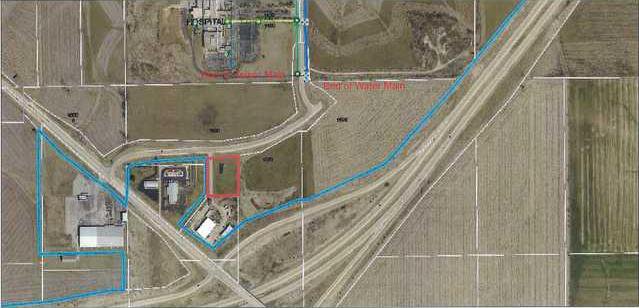The Platteville Common Council Tuesday night tabled a decision with implications for future development on the south side of the city.
The potential buyer of property on Enterprise Drive near Wisconsin 80/81 is seeking a waiver of a city requirement to hook up to city water and sewer service, which the real estate agent for the potential buyer says is “too much of a financial hardship.”
According to a Common Council memo, the potential buyer wants to buy about 1.32 acres of land on Enterprise Drive just north of the 80/81/U.S. 151 interchange for a $300,000 building for “a commercial business with potential draw from the region.”
The property has no water or sewer provisions, however, and is about one-sixth of a mile from the nearest city water and sewer mains, just south of Southwest Health.
The real estate agent, Renee Beyer of Lori Droessler Real Estate, requested city permission in March to install a well and septic system on the property, similar to nearby properties that had wells and septic systems installed before they were annexed into the city. The city Water and Sewer Commission recommended that the city consider extending water and sewer service to the property, paid for by Tax Incremental Financing District 6.
According to the Common Council memo, extending water and sewer is estimated to cost $140,000 to $150,000. The memo says the property if developed would generate about $2,300 in annual city property tax payments, although extending water and sewer service would be likely to spur more development in the area.
Southwest Health paid to install water and sewer when it opened its new hospital in 2005.
The council held a special work session meeting Tuesday afternoon before voting 5–1 Tuesday night to table the subject until more detailed cost estimates could be determined for water and sewer service and how a special assessment process might take place. (For more on Tuesday night’s meeting, read The Journal next week.)
“We’re in a predicament because we could be setting a precedent with other land owners in that area,” said at-large Ald. Tom Nall May 10. Nall said developers with large parcels of land could subdivide the parcels and then request well and septic, which “kind of defeats the purpose of why we want to put water and sewer out there.”
Complicating matters further is a state Public Service Commission rule that allows only 10 years for “fair share” payments to the city to hook up to city water and sewer for any property owner between the hospital and the Enterprise Drive land.
The potential buyer rejected two options due to cost — hooking up to city water and sewer service at the buyer’s cost, or having the city lend money to the buyer for water and sewer with a proposed downpayment of $30,000 and 10- to 15-year payback period. The latter proposal would include a provision to reduce payments if other property is developed between the hospital and Enterprise Drive and hook up to city water and sewer.
Another option would be for the city to install water and sewer and assess landowners an estimated $15,000 to $30,000 for the service, though the city has not issued special assessments in the past.
District 3 Ald. Barb Daus said special assessments are “very common,” but not in Platteville.
Nall said special assessments are “probably not the best thing for us to do.”
Another option is to allow the buyer to install a well and septic system, with a requirement to hook up to city services when they’re available. City staff is recommending a 10-year requirement to hook up, assuming water and sewer is available in the area by then. Geyer’s letter requested a minimum 10-year period before requiring city utility hookup.
“It’s going to be up to the Common Council to decide, but I think we’re all kind of torn about it,” said Nall. “We have to look at the taxpayers. And we also have to be consistent with what we’re doing. I want development, I really want it, but it’s prudent that we as a city are going to have to look at the future.”





